Who’s that trip-trapping over my bridge?
On our latest hike, the kids and I came across this little footbridge. Jacob, my firstborn, the child that I used to read to until my voice grew hoarse, immediately anticipated what I was about to ask and leapt into the dry creekbed (it’s raining here today, finally, after an insanely long dry streak).
I called the remaining troops into formation. “OK, guys, go over the bridge single file- let’s do the Billy Goats Gruff.”
Please note the look of utter disdain Maverick is giving me. Cassidy seems genuinely unnerved by Jake under the bridge and tears across before I can satisfactorily photograph the event.
I ask if we can try to recreate the story. “I need the littlest billy goat first,” I say.
Cassidy returns to the end of the bridge. Jake hams it up with much snarling and inexplicably sticking out his tongue. Cassidy wants to know what he’s doing. “He’s the troll under the bridge,” I tell her.
Cass cautiously begins to trip-trap…
“Who’s that trip-trapping over my bridge?” Jake croaks…
Cassidy picks up speed…
and kicks Jake in the face. (He dodges and is unhurt, people. No Eltons were harmed in the telling of this story.)
It is at this point that I realize that I have failed this child, my youngest, and she does not know the story of the Three Billy Goats Gruff.
So I give out the abridged version. This fairy tale is a morality story of greed, at its core. The littlest goat goes trip-trapping over the bridge. The troll, with his eyes “as big as saucers,” emerges from under the bridge to eat him. “Oh no, not me,” the littlest goat says; “My brother is coming over the bridge soon, and he is bigger, and tastier.”
The troll lets the littlest goat pass in anticipation of a better meal, and the middlest goat comes next. “Who’s that trip-trapping over my bridge?” the troll demands, and the middlest goat gives him the slip in the same way. “Oh no, you don’t want to eat me,” he says, “you want my brother, for he is so much bigger, and fatter, and tastier, with more meat on his bones.”
The troll is so very hungry by now, so eager for his big delicious meal. When he hears the trip-trap of the biggest goat, he greedily roars out his intention to devour the meat off his bones, to which the biggest goat replies,
Well, come along! I’ve got two spears,
And I’ll poke your eyeballs out at your ears;
I’ve got besides two curling-stones,
And I’ll crush you to bits, body and bones.
Now, for me as a child, I always loved the fun of playing the troll and snarling out in a voice dusty and grimy, “Who’s that trip-trapping over my bridge?” I also delighted in the ending verse, speaking out as the biggest goat, strong and sure and defiant.
Different kids take different things away. I can see that Cassidy gets a big kick out of the younger siblings totally selling out the elder. She’s a mischievous one, she is; I never even saw the story that way. I thought they had this all planned out, “Biggest goat will take care of that troll.”
Anyway.
This week is the ALA (American Library Association) Banned Books Week: a celebration of the freedom to read and the importance of the First Amendment. If you’ve been reading here for any amount of time, you know how important I think literature is, how I feel it connects our human condition. How we can become better people and better writers by hearing the clever and the thoughtful things others have said before us and applying that to our own lives.
I have TONS to say about the practice of banning books, especially children’s books, and I plan to spend the week getting it all out.
I don’t know how often fairy tales are banned outright, but I will tell you this: I had to really search hard to confirm I was remembering the verse quoted above correctly. And the Billy Goats Gruff is pretty tame as fairy tales go- this isn’t even a story from the Brothers Grimm, nor does anything bad happen to the protagonists.
All I found were overviews that presumed you knew the story, or sanitized versions (read: no fun to read out loud or re-enact).
I think there is something really wrong about that.
I think we’re robbing our kids of something vitally important when we neglect to pass on folklore and fairy tales. These are stories that have been told time and again, they resonate with truth and with magic and, let’s face it, with language that falls trip-trappingly from the tongue. They are fun to read aloud and fun for kids to hear, and shiver to.
They don’t just belong to us, they belong to childhood, and every child should hear them.
I’m a little behind, but I’ll catch up. Cass will hear all about Rapunzel locked in the tower, and Little Red visiting her grandmother. The real stories, the dark and delicious ones, where the danger is real and the triumphs are earned. I’ll tell them in voices that shriek with evil laughter, and quaver in fear, and creak and croak from disuse and living in dank conditions. I’m good like that.
It will be fun.
It might be a little scary, too. That’s OK. It will give Cass something to overcome, and feel brave about.
Once upon a time, my dad read fairy tales to me. I read them to my children, and think of him. They will read to their children (I hope), and think of me. And so on, forevermore, and so it has been, as long as parents have been telling morality tales to their children.
And we lived happily ever after.
It’s called oral tradition, folks, and I think it’s really important.
Do you read fairy tales to your kids? Why or why not?
P.S. Cass wanted to be the troll when we arrived at the next footbridge (note the outstretched tongue), and this is what I got out of my boys:
Oh, they think they’re funny. I guess it’s hereditary.
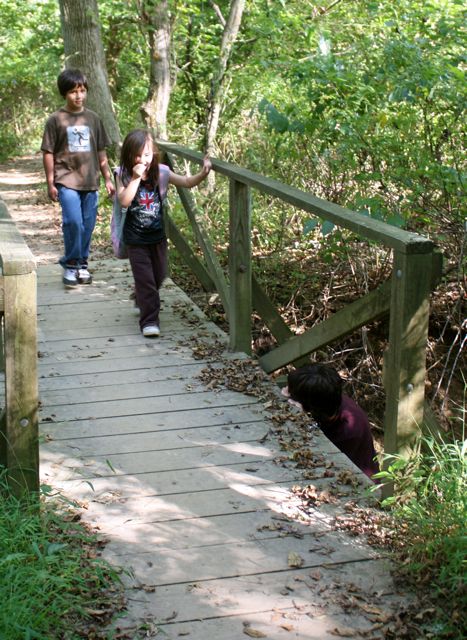
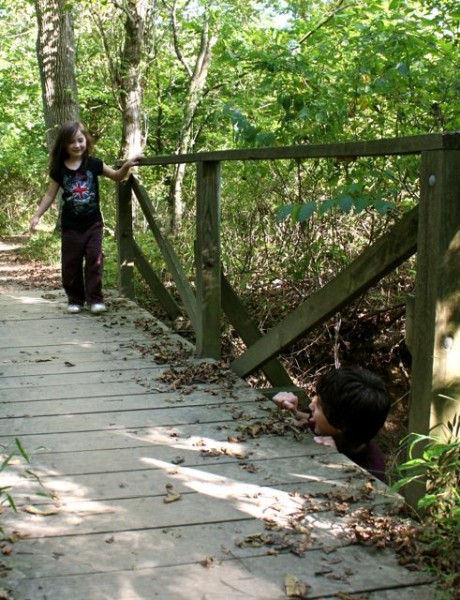
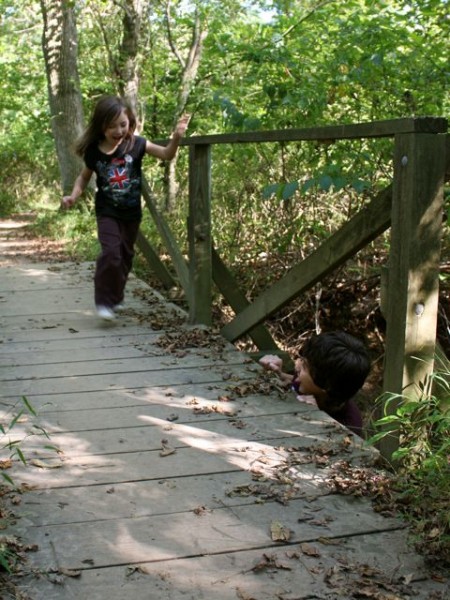
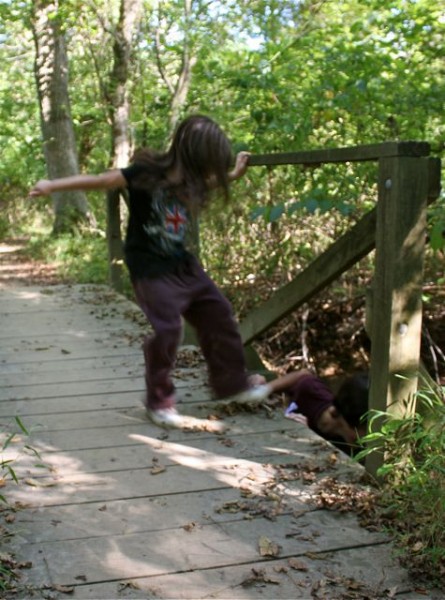
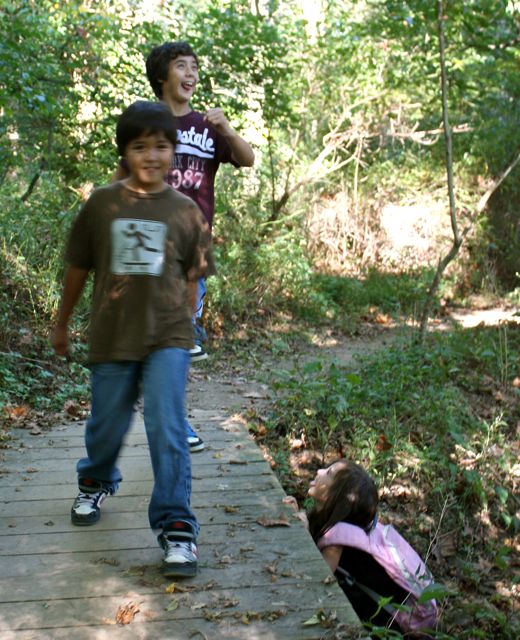

Leave a Reply